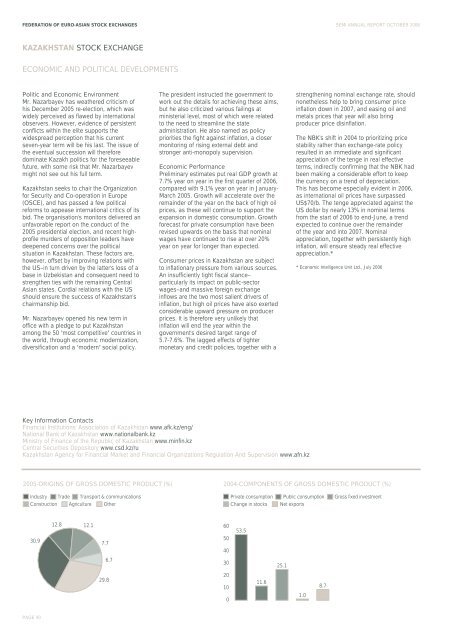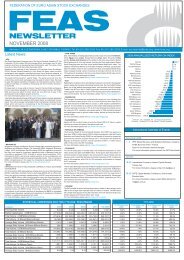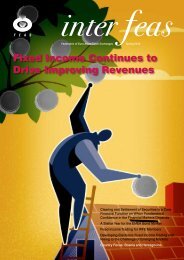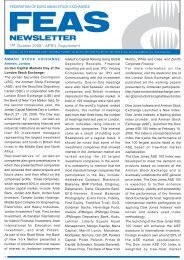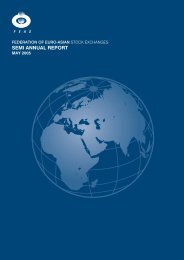Download - FEAS
Download - FEAS
Download - FEAS
You also want an ePaper? Increase the reach of your titles
YUMPU automatically turns print PDFs into web optimized ePapers that Google loves.
FEDERATION OF EURO-ASIAN STOCK EXCHANGES SEMI ANNUAL REPORT OCTOBER 2006<br />
KAZAKHSTAN STOCK EXCHANGE<br />
ECONOMIC AND POLITICAL DEVELOPMENTS<br />
Politic and Economic Environment<br />
Mr. Nazarbayev has weathered criticism of<br />
his December 2005 re-election, which was<br />
widely perceived as flawed by international<br />
observers. However, evidence of persistent<br />
conflicts within the elite supports the<br />
widespread perception that his current<br />
seven-year term will be his last. The issue of<br />
the eventual succession will therefore<br />
dominate Kazakh politics for the foreseeable<br />
future, with some risk that Mr. Nazarbayev<br />
might not see out his full term.<br />
Kazakhstan seeks to chair the Organization<br />
for Security and Co-operation in Europe<br />
(OSCE), and has passed a few political<br />
reforms to appease international critics of its<br />
bid. The organisation's monitors delivered an<br />
unfavorable report on the conduct of the<br />
2005 presidential election, and recent highprofile<br />
murders of opposition leaders have<br />
deepened concerns over the political<br />
situation in Kazakhstan. These factors are,<br />
however, offset by improving relations with<br />
the US–in turn driven by the latter's loss of a<br />
base in Uzbekistan and consequent need to<br />
strengthen ties with the remaining Central<br />
Asian states. Cordial relations with the US<br />
should ensure the success of Kazakhstan's<br />
chairmanship bid.<br />
Mr. Nazarbayev opened his new term in<br />
office with a pledge to put Kazakhstan<br />
among the 50 "most competitive" countries in<br />
the world, through economic modernization,<br />
diversification and a "modern" social policy.<br />
The president instructed the government to<br />
work out the details for achieving these aims,<br />
but he also criticized various failings at<br />
ministerial level, most of which were related<br />
to the need to streamline the state<br />
administration. He also named as policy<br />
priorities the fight against inflation, a closer<br />
monitoring of rising external debt and<br />
stronger anti-monopoly supervision.<br />
Economic Performance<br />
Preliminary estimates put real GDP growth at<br />
7.7% year on year in the first quarter of 2006,<br />
compared with 9.1% year on year in January-<br />
March 2005. Growth will accelerate over the<br />
remainder of the year on the back of high oil<br />
prices, as these will continue to support the<br />
expansion in domestic consumption. Growth<br />
forecast for private consumption have been<br />
revised upwards on the basis that nominal<br />
wages have continued to rise at over 20%<br />
year on year for longer than expected.<br />
Consumer prices in Kazakhstan are subject<br />
to inflationary pressure from various sources.<br />
An insufficiently tight fiscal stance–<br />
particularly its impact on public-sector<br />
wages–and massive foreign exchange<br />
inflows are the two most salient drivers of<br />
inflation, but high oil prices have also exerted<br />
considerable upward pressure on producer<br />
prices. It is therefore very unlikely that<br />
inflation will end the year within the<br />
government's desired target range of<br />
5.7-7.6%. The lagged effects of tighter<br />
monetary and credit policies, together with a<br />
strengthening nominal exchange rate, should<br />
nonetheless help to bring consumer price<br />
inflation down in 2007, and easing oil and<br />
metals prices that year will also bring<br />
producer price disinflation.<br />
The NBK's shift in 2004 to prioritizing price<br />
stability rather than exchange-rate policy<br />
resulted in an immediate and significant<br />
appreciation of the tenge in real effective<br />
terms, indirectly confirming that the NBK had<br />
been making a considerable effort to keep<br />
the currency on a trend of depreciation.<br />
This has become especially evident in 2006,<br />
as international oil prices have surpassed<br />
US$70/b. The tenge appreciated against the<br />
US dollar by nearly 13% in nominal terms<br />
from the start of 2006 to end-June, a trend<br />
expected to continue over the remainder<br />
of the year and into 2007. Nominal<br />
appreciation, together with persistently high<br />
inflation, will ensure steady real effective<br />
appreciation.*<br />
* Economic Intelligence Unit Ltd., July 2006<br />
Key Information Contacts<br />
Financial Institutions' Association of Kazakhstan www.afk.kz/eng/<br />
National Bank of Kazakhstan www.nationalbank.kz<br />
Ministry of Finance of the Republic of Kazakhstan www.minfin.kz<br />
Central Securities Depository www.csd.kz/ru<br />
Kazakhstan Agency for Financial Market and Financial Organizations Regulation And Supervision www.afn.kz<br />
2005-ORIGINS OF GROSS DOMESTIC PRODUCT (%)<br />
Industry Trade Transport & communications<br />
Construction Agriculture Other<br />
2004-COMPONENTS OF GROSS DOMESTIC PRODUCT (%)<br />
Private consumption Public consumption Gross fixed investment<br />
Change in stocks Net exports<br />
30.9<br />
12.8<br />
12.1<br />
7.7<br />
60<br />
50<br />
40<br />
53.5<br />
6.7<br />
30<br />
25.1<br />
29.8<br />
20<br />
10<br />
11.6<br />
8.7<br />
0<br />
1.0<br />
PAGE 90


